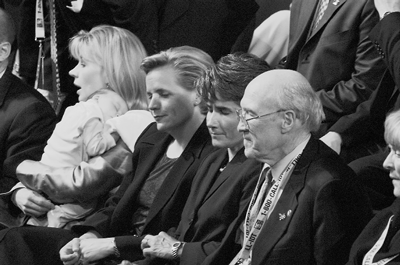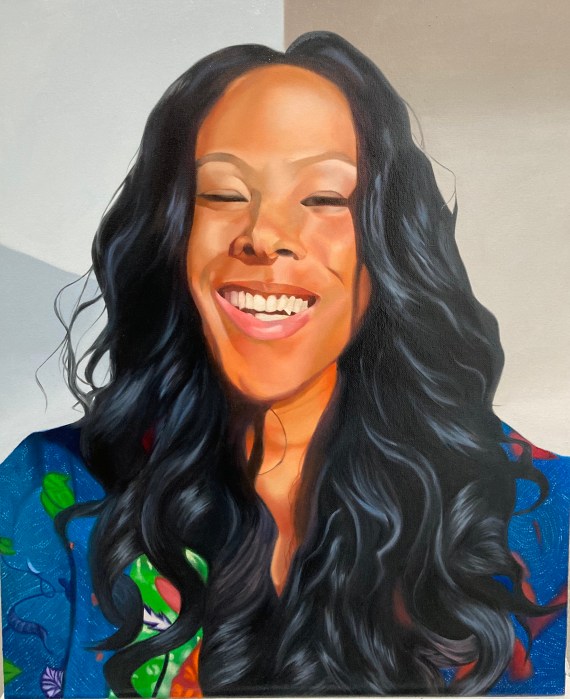Kerry mentioned Mary Cheney, discovering the new political third rail
The discussions about John Kerry using the “L-word” in the third presidential debate last week have entered their third reverberation in America’s media cycle.
The original sound of Kerry’s basso-profundo remark (“…and I think if you were to talk to Dick Cheney’s daughter, who is a [pause here, catch in the throat] lesbian…”) was drowned out first by the putatively impassioned pleas of a wounded mother—“The only thing I can conclude is he is not a good man. I’m speaking as a mom. What a cheap and tawdry political trick,” said Lynne Cheney.
And then it was drowned out again by the spin and counter spin of a hundred pundits.
Now, after numerous news cycles, the story is about people talking about people talking about a United States senator and prospective president saying in front of 50 million people that a daughter of the vice president of the United States is something even Showtime Television wouldn’t title their latest queer TV series—a dyke.
Not even a Kerry spokesman had the temerity to offer the most benign possible explanation—that Mary Cheney was simply the most prominent homosexual that Kerry happened to think of in the unscripted brawl of the debate. By that admission then, the campaign is saying that Kerry did mean to put her name out there, and put the L-word right next to it. Lesbian Mary Cheney. Mary Cheney is one of them. I want to make sure you know: Mary Cheney is a dyke.
So why?
“My only concern is that in a very close election, his comments could confuse and demoralize voters that Pres. Bush desperately needs,” said Gary Bauer, a former Republican presidential candidate and social conservative who heads a think tank called American Values. What Bauer meant is that Kerry was trying to make sure Christian conservatives know that despite the president’s advocacy of a constitutional amendment to ban gay marriage and his administration’s attempts to roll back protections for gay and lesbian federal government employees, his own vice president, just a heartbeat away, has a daughter who is one-of-them. And so maybe some of the conservatives will stay away from the polls on November 2.
The highest profile media critic of Kerry’s remark, the New York Times’ William Safire, said that, in effect, Kerry had outed Mary.
“Until that moment, only political junkies knew that a member of the Cheney family serving on the campaign staff was a homosexual,” Safire wrote on October 18.
The Wall Street Journal went further in an editorial on October 15, specifically terming Kerry’s action an “outing.”
But back in the Kerry camp, the senator’s famously outspoken wife, Teresa, opined, in an interview with PlanetOut.com, that the remark was flattery.
“John was being positive and complimentary of how the Cheneys have handled, openly, the question of their daughter’s lesbianism, just as John Edwards was in his debate.”
But Heinz Kerry doesn’t cut her husband a whole lot of slack.
“If John had really thought about it, he’d have mentioned no name,” she said. “He’d have talked about how people of all kinds of religious persuasions, conservative and liberal, have gay children, and that it’s not a choice.”
That is about as close as the campaign is likely to get to expressing regret about the remark.
Amidst all of the fire aimed at Kerry, there is also criticism toward the Republicans.
“Dick and Lynne Cheney screamed foul when the Democratic candidate mentioned their gay daughter. But for gays and lesbians, what is most outrageous is the Cheneys’ outrage,” screamed the headline over gay pundit Dave Cullen’s take on the situation on Salon.com.
Cullen wrote that Mary has been out or the closet for a decade, and “spent the late 90s working as a veritable professional lesbian” as a public relations person working to overcome the boycotts Coors beer had faced in West Coast gay bars dating back years to when the Coors family was deeply embedded in right-wing, often anti-gay causes. So Kerry hardly outed her.
But Cullen’s poignant main point is that if Kerry had said something like, “…and Mary Cheney, Dick Cheney’s public-relations person daughter,” Lynne Cheney wouldn’t have said a word. So why does saying Mary is queer deserve indignation?
“You’re embarrassed for us. And it’s infuriating,” wrote Cullen, directly his comments directly to Mary’s parents. “I doubt very much that Mary Cheney gives a rat’s ass if some church lady in Idaho knows she’s gay. But her mother cringing at the church lady knowing—that’s gotta hurt like hell.”
A similar perspective, offered by the wife of the Democratic vice presidential candidate, probably also delivered a sting.
“I think that [Mrs. Cheney’s complaint] indicates a certain degree of shame with respect to her daughter’s sexual preferences,” Elizabeth Edwards snapped in an interview on ABC radio news.
So, to wind back the tape to Kerry’s original remark—did he mean to be critical of Mary’s homosexuality? On gay civil rights issues, Kerry’s record places him not too far from the “most liberal senator” stigma that Pres. George W. Bush is working overtime to pin on him in the campaign’s final days. He voted against the 1996 Defense of Marriage Act, was an outspoken critic of Pres. Bill Clinton’s decision in 1993 to scale back his plan to allow gay and lesbian soldiers to serve openly, has promised a federal gay civil unions bill if he is elected president, and, now, in an interview the with Advocate magazine, has hedged, if only a little, on his opposition to same-sex marriage.
“I can’t tell you in 20 years or whenever, if someone made a persuasive argument, the world changes,” Kerry told the magazine a bit inconclusively.
David Mixner, the gay rights activist who went from friend and confidante of Clinton to protester outside the White House when the former president enacted his “Don’t Ask, Don’t Tell” compromise, said that he thinks the one issue that the episode raises—though a subsidiary issue, he heatedly claimed—is how uncomfortable the nation is with the children of our political candidates becoming issues themselves.
But like many Democratic insiders, Mixner said that the Republican reaction to Kerry’s use of the L word is a distraction from the real issues of the campaign, which he identified as millions of Americans being out of work and the war in Iraq.
“I wish John Kerry hadn’t said it,” Mixner said. “But I thought [the Republicans] were very clever in distracting the voters. Mary Cheney can swing naked from a trapeze for all I care, I refuse to engage in that.
“I just want to know when they’re going to bring our soldiers home from Iraq. That’s a meta issue,” Mixner said, before quickly adding, with more than a trace of impatience, “And this interview is taking away from that.”



































